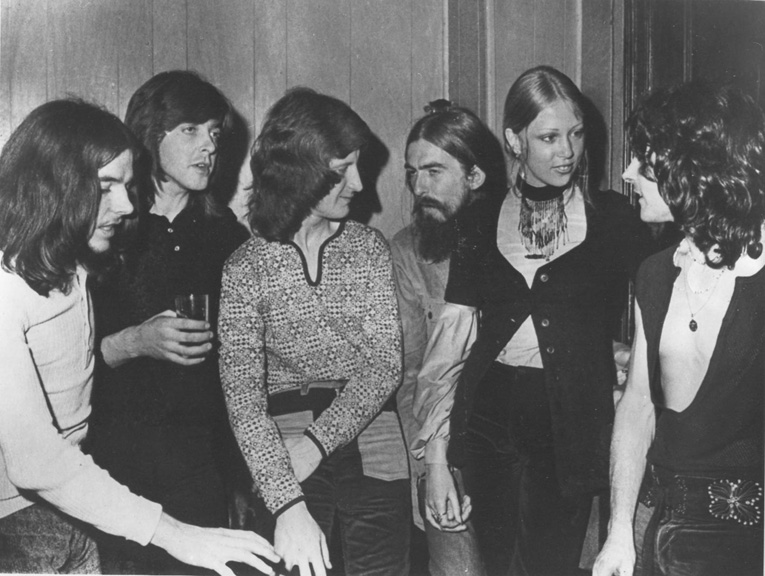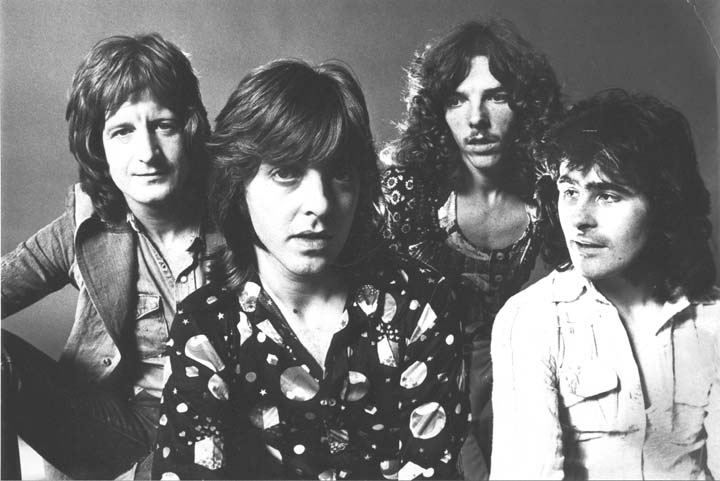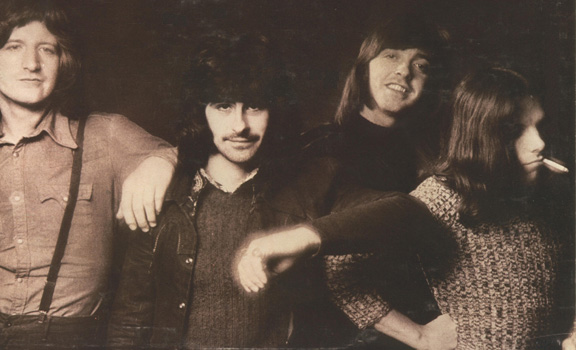The Badfinger Story: Triumph, Tragedy and the Beatles

Badfinger was a rock band formed in Swansea, Wales in the early 1960s who became one of the earliest representatives of the post-60s power pop genre. During the early 1970s the band was at times tagged as the heir apparent to The Beatles, partly because of their close working relationship with them and partly because of their similar sound. The band had four consecutive worldwide hit songs and contributed "Without You," a Number One Billboard hit for Harry Nilsson which was covered by hundreds of artists. Badfinger's two principally-known singers and songwriters, Pete Ham and Tom Evans committed suicide in 1975 and 1983.
After Badfinger's recording contract with Apple lapsed, band members entrusted their financial affairs to American businessman Stan Polley. Echoing the Beatles' own story, internal squabbling, artistic differences and alleged financial mismanagement ensued and eventually led to the bands' demise. Subsequent attempts to reform Badfinger at various times over the following decade floundered, due in large part to the earlier suicides of Pete Ham and Tom Evans, the band's main creative force.

Badfinger spent the early months of 1975 trying to figure out how to proceed with the unclear legal situation at hand, including the one withdrawn album and the one rejected album. Years earlier, Polley had established Badfinger Enterprises, Inc., which signed the members to various contracts that dictated that receipts of touring, recording, publishing and even songwriter performance royalties would go into holding companies controlled by Polley. This led to a salary arrangement for the group, which various members had at times complained was inadequate compared to their gross earnings. But by April 1975, salaries were no longer arriving and panic set in, especially for Pete Ham, who had recently acquired a house and whose girlfriend was expecting a child that May.[1]
According to their newest member, Bob Jackson, booking agents and prospective managers routinely turned the band away because of their restrictive contracts with Polley and impending legal actions. Ham tried many times to contact Polley by telephone during the early months of 1975, and was never able to reach him.
On 24 April 1975, Ham hanged himself in his garage studio in Surrey.[10] His suicide note, addressed to his girlfriend and her son, seemed to blame Polley for much of his internal despair and he cited his lost ability to cope with his disappointments in life. The note read: "Anne, I love you. Blair, I love you. I will not be allowed to love and trust everybody. This is better. Pete. P.S. Stan Polley is a soulless bastard. I will take him with me."[1] Ham had shown a growing mental illness over the past months as he burned cigarettes out on his hands and arms. Ham's daughter Petera was born a month after his death.[1]
After Ham's death, Badfinger dissolved. Late in 1975, Evans and Jackson helped establish a group called The Dodgers. The group released three UK 45's on Island Records in 1976. "Don't Let Me Be Wrong" was the only U.S. release, but it failed to chart. Subsequently, the management of the band fired Evans for insubordination and ordered all his performances deleted from the group's album recordings that later was released as Love On The Rebound. Molland had started a band in 1975 with Mark Clarke (Colosseum) and Jerry Shirley (Humble Pie) called Natural Gas. The group performed a few gigs as an opening act for Peter Frampton in 1976. They released a self-titled album and three singles, but none managed to chart. Gibbins performed session drumming for various Welsh acts, including Bonnie Tyler on her international hit "It's A Heartache," which reached #3 on the U.S. charts.
By 1977, both Molland and Evans were out of the music business; Molland occasionally laid carpet while Evans briefly worked insulating pipes. Molland describes his dire economic circumstances as follows: "Thank God I had guitars and I was able to sell some of that stuff. We were flat broke, and that's happened to me three times, where my wife and I have had to sell off everything and go and stay with her parents or do whatever. I installed carpeting for a while in Los Angeles and stuff like that. You do what you've got to do to survive."[11]

Later in 1977, U.S.-based drummer Kenny Harck and guitarist Joe Tansin recruited Molland to start a new band. When they needed a bass player, Molland suggested Evans, who joined after a visit to California in 1978. Suggestions from record companies led to the decision to rename the new band as Badfinger. Their “comeback” album Airwaves was released in 1979. Harck was fired from the band during the sessions and Tansin left the band immediately after the album was completed.[1]
To tour promoting the album, Molland and Evans recruited Tony Kaye (Yes) on keyboards and Peter Clarke (Stealers Wheel) on drums. The single "Love is Gonna Come At Last" from Airwaves reached #69 on the Billboard charts. The new Badfinger then recorded and released a second album, Say No More in 1981, with Glenn Sherba added on second guitar and Richard Bryans (Aviary) replacing Clarke on drums. This LP was distributed by Atlantic on the Radio Records label. The initial single, "Hold On," reached #56 on the Billboard charts. Ultimately, Evans and Molland split acrimoniously in 1981.
During 1982 and 1983, Molland and Evans then operated what turned out to be rival touring bands, both using the name Badfinger, which caused serious conflict in their relationship. In the summer of 1982, Evans teamed with pre-1975 Badfinger members Bob Jackson and Mike Gibbins and guitarist Adam Allen. In the fall of 1982, Evans, Jackson and Gibbins were joined by guitarists Reed Kailing (The Grass Roots) and Donnie Dacus (Chicago). In 1983 it was Evans & Jackson joined by post-1975 Badfinger members Tony Kaye, guitarist Glenn Sherba and drummer Lenny Campanaro. Earlier that year for his Badfinger band gigs, Molland had teamed with post-1975 member Joe Tansin.
In 1982, Evans and Jackson signed a management contract with a Milwaukee businessman John Cass, which led to a disastrous tour. Both were later sued (Evans for U.S. $5 million) when they denied any responsibilities of the contract, because of their stance that management obligations had not been performed.[1] Early in 1983, Evans and Jackson, with assistance from new member Al Wodtke(Kyx,Crow), completed four demos in Minneapolis, Minnesota under the name of "Badfinger" with David Bowie/Stevie Wonder manager Don Powell. These demos included Jackson's "I Won't Forget You," a tribute to deceased band member Pete Ham. These were briefly shopped but failed to generate strong interest.

On November 19, 1983, Evans and Molland had an extensive heated argument on the telephone regarding past Badfinger income still in escrow from the Apple era,[12] and the "Without You" songwriting royalties Evans was now receiving, which Molland, former manager Bill Collins and Gibbins all wanted a share in. Following this argument, Evans hanged himself in the garden at his home.[1]
In 1984, Molland, Gibbins and Jackson reunited as Badfinger, along with Al Wodtke and Randy Anderson(Jesse Brady) of Minneapolis, Minnesota, and played thirty-one dates as part of a 20th Anniversary of British Invasion acts, which included Gerry & The Pacemakers, The Troggs, Billy J. Kramer and Hermans Hermits.
In 1986, Molland and Gibbins resumed touring as Badfinger playing sporadic dates, until Gibbins left for good in August 1989.
Select Cuts:
Source Sites:
http://en.wikipedia.org/wiki/Badfinger
http://www.badfinger-iveys.com/
|
0
|

|
|
0
|

|
|
|
DCF
3/6/2010
DISCLAIMER: This posting was submitted by a user of the site not from Earth's Mightiest editorial staff. All users have acknowledged and agreed that the submission of their content is in compliance with our Terms of Use. For removal of copyrighted material, please contact us HERE.